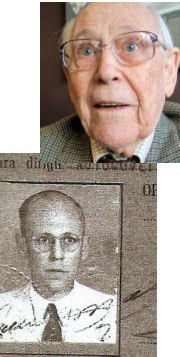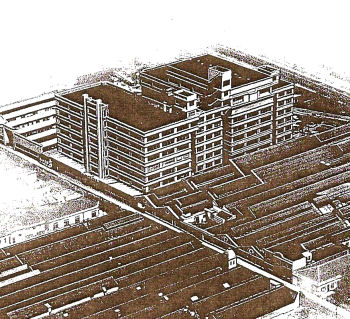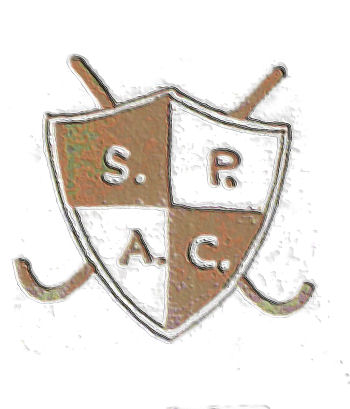Reminiscences
of my 60 years in South America | ||||||||||||||||||||||||
| ||||||||||||||||||||||||
São
Paulo Alpargatas 1953
- 1957 | ||||||||||||||||||||||||
"
How do I do it? " | ||||||||||||||||||||||||
Shortly before leaving Garça I wrote to my good friend, Comandante Frota, General Manager of the Moore McCormack Steamship Co, advising him that I had resigned from my job with Cia Agricola Rio Tibirica and was now ready to take up the position in his company that we had agreed upon in 1952 and that I would phone him upon my arrival in São Paulo in case he wished me to start work in their Santos office. A swift change of plan No sooner had I arrived at the São Paulo railway station, I went to a public phone and called my friend. Disaster!!!! Frota informed me that in 1952 it had been agreed that I would work at another company other than shipping for one year after which I would then apply for the position with his company. It was now 1954, almost two years later and regretfully the position had already been filled. He said he was very sorry and wished me luck! Something had to be done and fast. The money from my indemnity was coming to an end and I had to get a job and a home. Choosing one of the tallest buildings in São Paulo, I took the lift to the top floor and commenced walking down and entering each office where I thought my work experience could be useful to the firm. By good fortune one of the first offices I entered was that of Price Waterhouse,the auditors. I gave in detail my work experience with the Booth Line and with the fazenda. The partner I saw got on the phone, said a few words, then handed me his visiting card and told me to go to see a Mr Quillam at São Paulo Alpargatas, a Scottish textile firm. Next morning I duly presented myself at Mr.Quillam's office. I commenced by running through my CV when he stopped me saying "What sort of job are you looking for? I thought for a few moments, then replied "Something in Accountancy." His reply rather shook me. "Accountants are cheap labour. Hundreds of them. The only way to get on in this firm is as a salesman." Then he got out from his chair and beckoned me to sit down in his seat. Suddenly - I had sold myself I did so. "Comfortable?", he asked. "Yes, very", I told him. I got up and he said to me "My boy. Here in this firm we are not influenced by colour, race or creed. If you make good as a salesman, my chair can be yours. It is Thursday today. Can you start on Monday?" I hardly knew what to say. I knew nothing about sales. Had never sold anything in my life but it was a job and I needed desperately to provide for my wife and daughter, "Yes, I will be here on Monday." He smiled, then said "Report to Sr. Felipe at 9am Monday. Goodbye and good luck" With a certain amount of misgiving, I communicated all this to my wife. She agreed that I should do my best and perhaps it would work out. Now we had to find a home. Flats and houses in São Paulo were far too expensive but I got to hear of a single storey house in Congonhas, next to the airport. Although the main road to the airport was paved, all the roads around the airport were unmade. The house we took, after Helena beat the owner down from his asking price to something we could just afford, was in Rua Acruás with 4 or 5 other houses nearby. There was a small shop and a service station. Our furniture and belongings arrived next day from the fazenda and we spent the weekend getting straight. On Saturday evening, two men arrived at the door. When I asked them what they wanted, they said they had come to see the latest pornographic films. I pointed out to them that we didn't show films . They exclaimed that the previous occupant of the house always showed such films on Saturday nights. They seemed a little put out! On the Monday morning at 9 am I was at the office. Sr. Felipe welcomed me, then told me that I was to do a market survey on cotton blankets and to present my report on Wednesday. "How do I do it I asked?" " That is up to you", he replied.
I went into a café and had a cafezinho [ small black coffee] and I thought and thought. Then I went into the first shop I saw selling blankets. There was a pile marked ' Cotton Blankets '. I noticed there were several colours. I took a note of the prices. Then I went to another store and did the same. I asked questions and learnt that the cheaper blankets were often used to cover ironing boards. Next day I called at wholesale shops, found out the manufacturers, prices and, saying that I was a buyer from Tibirica Fazenda, found out about discounts. Wednesday morning I handed to Sr Felipe what I considered a magnificent report on cotton blankets complete with samples. He took it from me, threw it on to a pile of papers behind his desk saying "Now do a market report on Cotton Waste." Once more I followed my previous steps and on Friday presented another wonderful report full of prices, types, uses and samples. Again he threw the report on to the pile behind him and said "Today you will do a similar report on fishing twine and hand it in tomorrow. We work on Saturday mornings." From Monday you will be part of the Alpargatas Sales Team When I handed it in, as before it went on to the pile behind him. But this time he said to me "You have proved yourself to have what it takes to be a good salesman. From Monday you will be part of the Alpargatas Sales Team." "Sr Felipe. I put in a lot of hard work doing those reports but you haven't even looked at them. Why did you ask me to do them for you?" Sr Felipe smiled. "I am not interested in any of those items but I can see from the size of those reports that you have done a lot of investigation. You have shown initiative. You are not shy. You have asked questions. All those attributes point to a good salesman " The principal article produced by the factory was the Alpargatas shoe with its twine like sole. This shoe was most popular especially amongst with general public. The factory also produced Denim cloth known as Brim Coringa. Later the factory went on to produce blue denim trousers under the trade mark Far West. Also produced was a cotton cloth in sundry colours and Tocuyo, an unbleached cloth. They also sold canvas shoes or plimsolls produced by a neighbouring factory. The factory hours were 8 am till 5 pm with an hour for lunch served at the factory canteen. However, there was a group of salesmen who sold to retail shoes in Sao Paulo city who started at 7 am. Each salesman had a small truck in which was placed the sales he had made the previous day. His job was to deliver the orders and collect payment at the same time. In the rest of the time he would obtain fresh orders. These salesmen were known as the "Banda" I spent the first month going out with salesmen visiting their clients in the Capital. Then I spent another month with salesmen in the interior of Brazil. It was then decided that instead of being an actual salesman, I would be better controlling the salesmen. Checking their daily and monthly reports, their sales and their collections. I enjoyed myself. Then one year end when sales generally had been below normal, it was arranged that all the salesmen would go on their annual holiday and the office staff would take over their zones. The pistol was pointed at my head I was allotted Goias. Armed with a bag full of samples, I flew there arriving on a Friday late afternoon. Saturday morning after breakfast at the hotel, I was wandering around town to get my bearings when I saw a shop open so I popped inside saying my set piece "Good morning from São Paulo Alpargatas". The owner, a fearsome looking Jew, holding a pistol straight at me, shouted "Get out of here before I shoot you. I allow no one to try to sell things to me on the Sabbath. Get out!" On Monday morning, I hesitated to go into his shop. Standing just outside the doorway, I poked my head round and said "Good morning. Is it safe to come in?" He burst out laughing and signalled for me to enter. To my surprise he turned out to be quite human asking me if I was new to the job, how long I had been with the company etc. Then he 'rewarded' me by placing an order for everything on my list. What with the few orders I obtained from other clients, when I returned to the office, it was found that I had exceeded all records for orders from Goias. As time went by, I was given other jobs to do including the setting up of Sales Meetings. I enjoyed these as it not only gave me an opportunity to speak based on what I had been reading in sundry sales magazines from the States, but it also meant travelling to Porto Alegre or to Rio de Janeiro where the meetings were held. To liven up the proceedings, I drew little sketches titled "How not to interrupt meetings." Later, I began to draw up statistics of each salesman's sales record item by item. Then the firm decided that every town or village with a population of more than 500 should be visited at least once a year to ensure that their Alpargatas shoes were well distributed. There was a small town called Cascavel close to Foz do Iguaçu on the borders with Argentina. I decided to visit the town to see what sales could be made there. It was difficult journey, first by plane and then by bus on a mud road. The hotel was made of wood. After dinner, consisting of a very greasy soup followed by a remarkable stringy chicken and goiabada, I went to bed. They gave me a candle and a box of matches as there was no electricity. There was no window. That is,there was a space covered by a wooden shutter. An orchestra of sounds The night was an orchestra of every type of animal sounds. It was so warm that I decided to leave the shutter of the window open trusting that no nasty animals would take it into their head to join me in bed. It was around midnight when I felt a sharp prick in my leg. Fumbling for the matches, I finally lit the candle and looked down. There was blood on the sheet. The flow of blood soon stopped and as there was nothing that I could do, I went back to sleep. In the morning, I mentioned this to the owner of the hotel who calmly said "Oh it was probably a vampire bat. We get quite a lot of these. They do not kill people. You don't need to worry!" After visiting the single shop in the village, I decided to go and visit the famous Iguaçu Falls [also Iguazú or Iguassu] before heading back to São Paulo. Some time before I actually saw the Falls, I could hear the thunderous roar of the water falling from a height of 237 feet. The Falls are certainly impressive as they pour down over an arc some 2 ½ miles wide with all the colours of the rainbow arched above the waters. Here and there on rocky ledges were masses of flowers in full bloom. I regretted that I had not brought my camera with me. On the Argentine side a hotel had been built for tourists and arrangements made to take them to see the Falls. Unfortunately there was nothing on the Brazilian side. Getting to and from the Factory was very tiring. I had to leave the house at 6.15 every morning to board the bus at the airport. Then it was up to an hour's ride to town, the bus leaving me under the overhead roadway at Avenida Anhangabaú. From here I walked across town to the Praça da Sé the central point of the city where I took another bus to the Mooca district. Then a short walk to the factory. However, the return journey was far worse. Leaving the factory just after 5 pm, I had to catch a bus to Praça da Sé, walk across to Anhangabaú where I would often wait in a queue till almost 8 pm getting back home after 9 pm. Not only was it tiring but I had little home life. As
soon as I could afford it I bought myself a first edition Ford Anglia car which
had certainly seen better days. However, it made a lot of difference except that
it was not very good at going uphill! Now I could arrive home shortly after 6
pm. On Sundays we would drive to a market at Moema not too far away and purchase
what we needed for the week. I joined the São Paulo Athletic Club and played
tennis whilst Barbara was able to enjoy the playground. We made many friends and
went to dances. The President fixed it President Odria of Peru made an official visit to Brazil. When he visited São Paulo, the Peruvian Consulate sent me an invitation to a reception in the President's honour. I spoke to the President and when I told him that I had lived in Iquitos for two years he said that I should return to Peru as there were plenty of jobs for Englishmen. He said that if I had any difficulty in obtaining my carnet de estranjeria, {foreigner's permit to reside]to speak to him and he would arrange it. When I eventually did go back to Peru, I called at his house (he was no longer President) and he welcomed me recalling our meeting in São Paulo. I had no trouble getting my 'carnet'. Helena was now expecting our second child so she decided to fly to Lima to be with her mother when the baby was born. Barbara was now 5 years old and accompanied her mother. The idea was that after the baby was born and it was considered safe for Helena to return to São Paulo, she would do so. Meanwhile, I was to look around for a bigger house and, if possible, nearer to the factory as the time I had to spend travelling to and from the factory was getting me down. Then came a great event in my life. I read in the newspaper that the Brazilian Air Force were flying twice a month to Lima with diplomatic mail and they allowed those wishing to visit Lima a free return flight. It was a case of first come, first served. I
put forward my name and was allotted a place. The flight was not especially comfortable
and for several reasons, I had to return overland. But whilst in Lima I was offered
a job with the large textile firm Duncan Fox. I accepted and so in May 1957 I
left Brazil for Lima, Peru where I had received a contract to work as Sales Manager
for the textile firm Textiles Generales. | ||||||||||||||||||||||||
|


 Then I heard that hockey was played. I bought a hockey stick and soon was playing
most Saturday afternoons. Then I was elected captain and I started up matches
against a team down in Santos.
Then I heard that hockey was played. I bought a hockey stick and soon was playing
most Saturday afternoons. Then I was elected captain and I started up matches
against a team down in Santos.